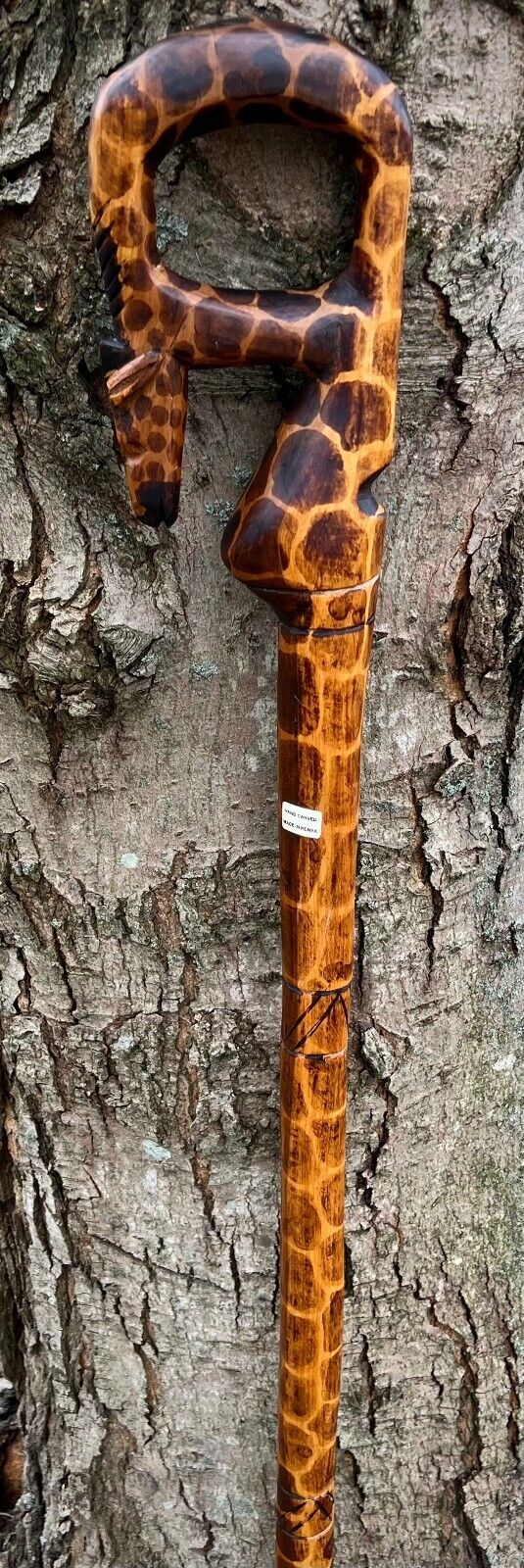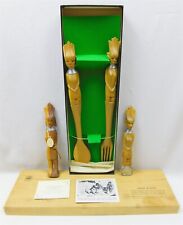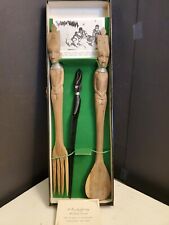When you click on links to various merchants on this site and make a purchase, this can result in this site earning a commission. Affiliate programs and affiliations include, but are not limited to, the eBay Partner Network.
Intro:
This is perhaps one of the most extraordinary works of hand carved wood sculpture I’ve seen in my 76 years on this earth…. and I do not believe I am the slightest bit biased in saying so. I’ve owned this cane since 1976, yet - each and every time I hold it in the palm of my hand I come away absolutely dumbstruck. The wood, the design, the raw, rugged natural beauty… made in Kenya in the early ‘70s, this walking stick showcases the true power of human hands. No heavy machinery, no fancy gadgetry - rather - simply the product of an undeniably masterful Kenyan artist. You will come across a lot of wooden walking sticks on the world wide web claiming to be “African Made,” or “Kenyan Made.” I can assure you, the vast majority of these are not what they claim to be. Additionally, this Kenyan made walking stick (with a ‘60s origin) was made by a single small output artist - selling at 3 or 4 Kenyan flea markets. “African Made” these days, on the other hand, can mean mass produced (using cheap, modern materials) in a warehouse in downtown South Africa. Heavy, THICK, wonderfully textured (with varying surface dips, rises, in the perfectly polished wood) this mvuli wooden walking stick is truly a beautiful reminder of an Africa gone by.
Background:
I first came across this piece while living in San Francisco, California in the mid ‘70s. One of my favorite boutiques downtown was more like that of a cultural arts museum. The owner was part Senegalese, and periodically made trips back to the continent of Africa to pick up works of art produced throughout. I remember in particular that he had a real attachment to Kenyan artists. “They are the best with wood,” he would say, “it’s in the hands.” Well, on a visit one afternoon, stepping into a back room, I noticed a large urn of sorts housing a few walking sticks. One cane in particular immediately struck my eye with its mottled blotches on a warm, saturated STUNNING wood… I carefully removed the cane from the urn, and held its handle in the palm of my hand. A giraffe! But a beautifully done artistic representation of an already stunning creature. I couldn’t believe the weight of the wood… the intricacies of the carvings… the highly contrasting hues (that of the mvuli wood itself, and the finished paint.” Now… I have to say - while I frequented this man’s shop on a twice a month basis, and had for years, I did NOT commonly make purchases…. the shop (though it had some incredible works of art I’d have killed to showcase in my home) was beyond my price range. That said, the moment I held this walking stick, I knew that no matter the price, I just had to do it. Suffice to say, I paid FAR more for this cane (way back in the ‘70s) than I am listing it for now. My wife nearly killed me at the time when she came home that evening to find my new purchase…. mounted (horizontally) on my office wall.
The Walking Stick Itself:
This walking stick is crafted from mvuli wood, and was made by a Kenyan man in the 1960s. The shop owner I purchased the cane from told me of a man and his wife, who were quite known in their region for their manipulation of the mvuli wood they worked with. While the couple primarily made walking sticks (mostly resembling African animals) they also made chairs, stools, cooking utensils, and even doors out of mvuli wood. Apparently, the shop owner in San Francisco had brought this walking stick back on a trip in the early ‘70s, and the piece had sat in his shop for a few years until I “uncovered it.”
The cane is heavy, it is THICK and wonderfully solid (no hollow elements whatsoever throughout the entirety of this piece). This is one such thing I LOVE about this walking stick. Often times, walking sticks that could be deemed “decorative” are rendered functionally useless with a slim, lightweight, hollow, fragile frame. This cane? It is incredibly strong - given it is solid through and through and entirely mvuli wood. It is absolutely functional if you should so desire - though I myself never used this cane, but rather kept it as a display piece in my office through all the years. The wood is beautifully treated, and (one of my favorite elements) remarkably smooth. Because this cane was honed entirely by hand, it has a tremendous amount of originality and character. There are subtle rises and falls, peaks and valleys throughout the smooth thick mvuli wood complexion. From strictly a materials standpoint, the wood used to create this walking stick is nothing short of otherworldly….. a naturally beautiful element of African nature.
The design… but of course, one cannot talk about this Kenyan made walking stick without speaking about the masterfully executed, and wonderfully creative design scheme. This walking stick was meant to resemble that of the giraffe. In this way, the entire body of the cane acts as the giraffe’s “neck.” The top of the cane, the handle, croons the giraffe’s neck down to a point, as if the animal were stooping down for a drink. The entire cane is mottled in deep brown painted splotches - that so perfectly capture the brown splotches that adorn a real giraffes body. Just before the handle of the cane, you’ll notice a particularly thick, and bulbous area of the mvuli wood. This was done intentionally, with the artist aiming to craft the giraffe’s “chest.” In my mind, he does this so expertly. The long, crooning neck of the handle extends from the bellowing thick mvuli wood “chest” of the beast. As for the head, well - just LOOK at the detail present. Keep in mind that every etching you see that defines this animal’s head is done by human hand alone…. nothing but blades… I could not do here what this person does by hand using every power tool sitting out in my garage… absolutely incredible. You’ll notice that at the giraffe’s head on the cane handle, you can make out features such as the animal’s mouth, nose, eyes, ears, even tufted fur at the nape of the neck. Not only this, but the head crafted here actually looks like that of a giraffe’s! This is indeed an artistic representation of the giraffe… one that does not adhere to the strict accordances of anatomical accuracy. That said, this walking stick is easily and readily identifiable as a giraffe!
In addition to the stunning handle on this walking stick, I did want to point out a few other carved elements present on this piece. Throughout the cane’s body their are wonderful etchings of traditionally african patterned arrays. These carvings (deep and black filled over time) give both a sense of depth and contrast to an already complex piece. The carvings may seem a small touch, but they are so expertly executed, and so tastefully and purposefully added that they truly do add to the piece’s overall beauty.
This cane is THICK, as mentioned earlier. A truly HEFTY chunk of mvuli wood. Look at the above photo of the can in hand to get a bit of perspective on how bulky this antique Kenyan walking stick truly is.
This walking stick is not tipped, nor has it ever been. If you intend to use it functionally, I highly suggest adding a rubber tip (I might also suggest, maybe do not use it functionally). Truth be told, while I know it to be none of my business how the next owner makes use of this cane, I believe it belongs on a wall, where it can be displayed (and discussed). It is a work of art, rather than just a tool…
You might think you see what appear to be hairline “cracks” on the cane. These are NOT cracks. This is exactly the way the cane looked when I purchased it in the ‘70s. They are not cracks, but tiny fissures in the utmost surface of the wood (a product of the natural wood itself). This cane is in exemplary condition, period.
One final note, as you can probably tell - I am very, very fond of the piece. I believe it to be an irreplaceable work of antique Kenyan art. So why am I selling it then? Truth be told, I am 76 years of age and I am not getting any younger… in the day and age today, it appears even getting sick is not longer what it used to be… I do not have anyone to pass this cane on down to who would appreciate it for all that it is - therefor - I am trying to find the next proper home for a much loved piece before I pass on. I do not mean to sound grim, only, I don’t want this walking stick to end up in someones garage…. or thrown amongst a bin of things at an estate sale.
There is a sticker on the cane that was there when I purchased that reads “Made in Kenya.”
Overall, it will be a bittersweet moment when this piece goes out, but I cannot WAIT for this walking stick to enter the next phase in its hopefully very long life.
If you have any further questions, or would like to see any additional photos, please do not hesitate to reach out in the form of an email. I will get back to you promptly.
DIMENSIONS:
Circumference (length around) the Body of Cane: 4”
Circumference (length around) Handle (where you grab) 4.25”
Length of Cane (top of handle to very bottom) 36.25”







